Welcome to our free classical music site

Do you write about classical music? Are you a blogger? Want to team up with Classical Connect? Send us a message, let's talk!

Do you write about classical music? Are you a blogger? Want to team up with Classical Connect? Send us a message, let's talk!
This Week in Classical Music: September 6, 2021. London Young Musician. One of our goals here at Classical Connect is to support and promote young artists. London Young Musician is an online competition which has similar goals. Even though this week is rich on significant birthdays (from Isabella Leonarda to Hernando De Cabezon, Antonin Dvořák, Henry Purcell, William Boyce and Arvo Pärt), we decided to publish their announcement as London’s deadline is fast approaching. Here it is:
significant birthdays (from Isabella Leonarda to Hernando De Cabezon, Antonin Dvořák, Henry Purcell, William Boyce and Arvo Pärt), we decided to publish their announcement as London’s deadline is fast approaching. Here it is:
London Young Musician is an international online music performance competition focusing on supporting the worldwide learning and creation of classical music. It is open to young musicians under the age of 28 and is available to all classical music instruments and vocals. The competition is held entirely online and welcomes applications from around the world. It provides excellent experience of competing internationally, without the hassle of travelling.
Thousands of candidates from over 70 countries and regions enter the competition. The international jury panel consists of professors from the Royal College of Music and experts from all over the world. It has a unique competition system designed by world-class education specialists, which provides professional pathways and resources for young musicians to build higher musical skills.
The competition seeks talented musicians who have excellent musical skills, a strong personality and fantastic creativity in their video performance.
Seasonal Competitions:
Four separate seasons per year with each seasonal competition being held every three months. All candidates receive an e-certificate and adjudicators’ comments.
For every season, the jury panel awards gold, silver, bronze and special prizes to competitors from each category. Gold Prize winners will have their name displayed in the London Young Musician Hall of Champions and are featured in an official LYM showcase video. Special prizes including Fantastic Technique, Expressive Performance, Characteristic Performance and Stylish Video. These are awarded to the candidate who has shown a unique side of themselves in their video performance. Other exciting prizes are available such as ranking medals, a mid-season online concert invitation, Educator Awards.
Award Points are awarded to all seasonal winners. These points can be used for entering the World Musicians Rankings or for entering the Musician of the Year annual competition in April.
Musician of the Year:
Seasonal winners who have gained 6 award points or more can then enter the annual competition ‘Musician of the Year’. This year-end competition consists of a first round and a Final Round. The final round is live streamed by True Art TV. Apart from jury members’ marks, audience vote helps to determine the final results. The World Musicians Annual Ranking will also be calculated after Musician of the Year results are published. This ranking is calculated based on the total scores of musicians in both seasonal competitions and Musician of the Year in the same competition year.
The annual awards include: cash awards totaling £1000, an interview published in World of New Classical Musicians magazine, a CD making opportunity with the True Art TV label, the opportunity to perform in the mid-season online concert, Champion Trophies, Ranking top 1 medal and exclusive London Young Musician teddy bears.Permalink
This Week in Classical Music: August 30, 2021. Bruckner and more. Anton Bruckner was born on September 4th of 1824 in a small town of Ansfelden near Linz. We love Bruckner, we’ve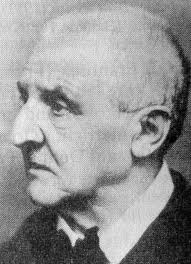 written about him on a number of occasions, and presented many of his symphonies (take a look here). One symphony that so far was missing from our library is Bruckner’s Symphony no. 2. As so many other compositions, it has a rather torturous history. Even though it is listed as number two, it’s the fourth symphony that Bruckner composed. Bruckner was a late starter: the very first symphony he wrote, in F minor without a number (but sometimes called “Symphony 00,” or “Study Symphony”) was an immature attempt composed in 1863; it was premiered more than a century later, in 1972, and is almost never performed. Then, in 1866, came Symphony no. 1, which Bruckner, famously unsure of himself, rewrote a number of times, and which exists in several versions. But at least this one Bruckner felt was worth performing. Three years later, in 1869, he composed Symphony in D minor. At first, Bruckner called it his symphony number two, but after Otto Dessoff, a prominent composer and conductor with the Vienna Philharmonic, asked him, "But where is the main theme [of the first movement]?” he removed the designation, wrote on the front page that it was nullified and put number zero instead of two. Thus, this symphony is often called “Number 0,” or, in German, “Die Nullte.” By 1872, at the time he composed what we now know as his Symphony no. 2, Bruckner was living in Vienna and teaching at three different institutions: music theory at the Vienna Conservatory, harmony and counterpoint at the University of Vienna and piano at St Anna’s teacher-training college for women. A great organist, he also performed in Austria and other countries, and had little time left for composing. Nonetheless, the Second symphony turned out to be his largest, most ambitious and sophisticated piece up to that point. Bruckner attempted to dedicate the symphony to Franz Liszt, but Liszt rejected the offer (we can only imagine how terribly Bruckner was hurt). He later offered this symphony and the next one, number three, to Brahms, who selected the latter. Thus, Symphony no. 2 isthe only one of Bruckner’s symphonies without a dedication. As always, Bruckner, nervous and unconfident of his gifts, wrote several versions, and had several printed editions. We’ll hear the Symphony in its second major revised version, from 1877, in the so-called Haas edition. The Royal Concertgebouw Orchestra is conducted by Bernard Haitink in this 1969 recording (here).
written about him on a number of occasions, and presented many of his symphonies (take a look here). One symphony that so far was missing from our library is Bruckner’s Symphony no. 2. As so many other compositions, it has a rather torturous history. Even though it is listed as number two, it’s the fourth symphony that Bruckner composed. Bruckner was a late starter: the very first symphony he wrote, in F minor without a number (but sometimes called “Symphony 00,” or “Study Symphony”) was an immature attempt composed in 1863; it was premiered more than a century later, in 1972, and is almost never performed. Then, in 1866, came Symphony no. 1, which Bruckner, famously unsure of himself, rewrote a number of times, and which exists in several versions. But at least this one Bruckner felt was worth performing. Three years later, in 1869, he composed Symphony in D minor. At first, Bruckner called it his symphony number two, but after Otto Dessoff, a prominent composer and conductor with the Vienna Philharmonic, asked him, "But where is the main theme [of the first movement]?” he removed the designation, wrote on the front page that it was nullified and put number zero instead of two. Thus, this symphony is often called “Number 0,” or, in German, “Die Nullte.” By 1872, at the time he composed what we now know as his Symphony no. 2, Bruckner was living in Vienna and teaching at three different institutions: music theory at the Vienna Conservatory, harmony and counterpoint at the University of Vienna and piano at St Anna’s teacher-training college for women. A great organist, he also performed in Austria and other countries, and had little time left for composing. Nonetheless, the Second symphony turned out to be his largest, most ambitious and sophisticated piece up to that point. Bruckner attempted to dedicate the symphony to Franz Liszt, but Liszt rejected the offer (we can only imagine how terribly Bruckner was hurt). He later offered this symphony and the next one, number three, to Brahms, who selected the latter. Thus, Symphony no. 2 isthe only one of Bruckner’s symphonies without a dedication. As always, Bruckner, nervous and unconfident of his gifts, wrote several versions, and had several printed editions. We’ll hear the Symphony in its second major revised version, from 1877, in the so-called Haas edition. The Royal Concertgebouw Orchestra is conducted by Bernard Haitink in this 1969 recording (here).
Bruckner was not the only composer born this week. Darius Milhaud, the French composer and one of Les Six, was born on September 4th of 1892. And on September 5th we have four more birthdays: Johann Christian Bach, the youngest of Johann Sebastian’s eleven sons, known as “the London Bach,” the Jewish-German composer Giacomo Meyerbeer, born in 1791, who was probably the most popular opera composer of the 19th century, John Cage, one of the most prominent avant-garde American composers, in 1912, and Amy Marcy Cheney Beach, now more popular than ever, in1867.
We’d also like to mention three conductors, all born on September 1st: the great opera conductor Tullio Serafin in 1878, Seiji Ozawa in 1935 and Leonard Slatkin in 1944.Permalink
This Week in Classical Music: August 23, 2021. Microtonal Music and Easley Blackwood. When we listen to music, we rarely think about tuning: while dissonances abound, the basic scale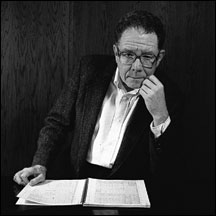 sounds good to our ear. But in reality, this is not quite right: take 12 fifths up from a C, and you'll arrive at B-sharp, which, in perfect-fifth-based tuning is a little higher in pitch than C. But B-sharp and C are meant to be the same in standard tuning! Assuming C is equal to 256 Hz, a perfect-fifth based B-sharp (octave-reduced) is about 259.5 Hz, which is about 23 cents too sharp (or, about a fifth of the way from one note to the next on the standard piano). Even if not perfect, a “well-tempered” (remember Bach?) scale sounds good to our ear. But what if we decided to use microtones intentionally, to create music? Stephen Weigel, a composer and performer, writes about Easley Blackwood, who did just that: he composed many pieces using microtonal scales. Here are two etudes by Blackwood to illustrate his music, the 17-note Etude (that is, when one octave is divided into 17 equal intervals; equal in the sense that the frequency ratios of all intervals are equal) called Con moto and the 21-note, Suite in four movements. The Etudes referenced below. And now, to Stephen Weigel.
sounds good to our ear. But in reality, this is not quite right: take 12 fifths up from a C, and you'll arrive at B-sharp, which, in perfect-fifth-based tuning is a little higher in pitch than C. But B-sharp and C are meant to be the same in standard tuning! Assuming C is equal to 256 Hz, a perfect-fifth based B-sharp (octave-reduced) is about 259.5 Hz, which is about 23 cents too sharp (or, about a fifth of the way from one note to the next on the standard piano). Even if not perfect, a “well-tempered” (remember Bach?) scale sounds good to our ear. But what if we decided to use microtones intentionally, to create music? Stephen Weigel, a composer and performer, writes about Easley Blackwood, who did just that: he composed many pieces using microtonal scales. Here are two etudes by Blackwood to illustrate his music, the 17-note Etude (that is, when one octave is divided into 17 equal intervals; equal in the sense that the frequency ratios of all intervals are equal) called Con moto and the 21-note, Suite in four movements. The Etudes referenced below. And now, to Stephen Weigel.
Easley Blackwood was born on April 21, 1933, in Indianapolis, Indiana of the United States. He was a composer, pianist, theorist, and professor Emeritus at the University of Chicago. One of his most well-known compositions is the Twelve Microtonal Etudes for Electronic Music Media, which is a set of electronic pieces written in microtonal equal temperaments. For those who are unfamiliar, "microtonal" scales are those that divide the octave into a different number of notes than the standard twelve found on a piano. Microtonality is regularly used in traditional non-Western music, and it allows the opportunity to create completely new-sounding melodies and chord progressions, which is part of the reason why Easley Blackwood wrote music in these novel tunings. The Twelve Microtonal Etudes use equal tunings 13 through 24 individually, and each equal tuning has its own sort of feeling or character. Most of the individual movements are in a strongly tonal style, while some rely less on functional chord progressions and more so on complex altered chord changes or melodic ideas. The tonality you might hear in these pieces is unlike anything you will hear in 12-tone equal temperament. People commonly cite microtonal chord progressions as having a "warped" feeling, like looking in a funhouse mirror. Twelve Microtonal Etudes was recorded in 1981 with the Polyfusion synthesizer, housed in St. Louis's Webster College. It was a lot more difficult to synthesize microtonal scales with the Polyfusion synthesizer back then than it is today with digital synthesizers, which is part of the reason why these pieces are such a monumental achievement for the time period. Blackwood not only had to play each part one melodic line at a time (monophonically), but he also had to create his own notation for each tuning system, and read that on the standard keyboard with the offset! This meant that if he was playing with 13 equal notes per octave, for example, that an octave would span 13 notes on the keyboard instead of the usual 12 - and that logic applies to each equal tuning used. The project was also completed within an extremely short 13-day time period. The tactful composition, golden analog charm, and history have made this piece into a microtonal classic. Recently there has also been a revival of interest in these pieces, because of their age and accessibility. It is commonly cited as microtonal inspiration, and Matthew Sheeran, Stephen Malinowski, and Stephen Weigel have also created arrangements and MIDI follow along videos.Permalink
This Week in Classical Music: August 16, 2021. Ginette Neveu and Karlheinz Stockhausen. Last week we promised to write about the violinist Ginette Neveu. The reason Neveu is not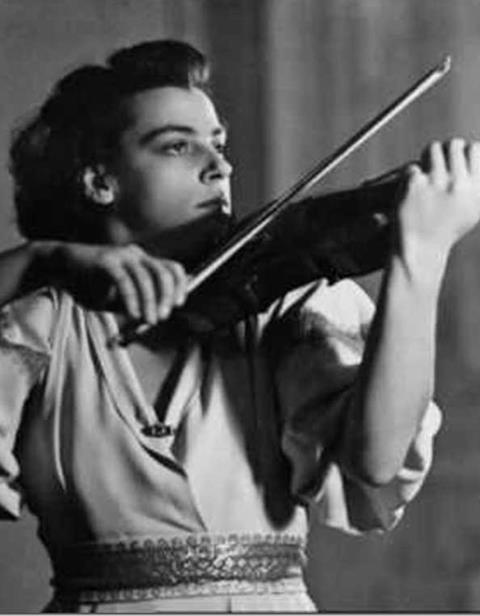 better known is because her life was tragically short. Neveu was born in Paris on August 11th of 1919. Her mother was Ginette’s first violin teacher. Ginette made her first public appearance at the age of seven playing Bruch's Violin Concerto no. 1 and later that same year performing Mendelssohn’s Violin Concerto with the Colonne Orchestra under the direction of Gabriel Pierné. She studied at the Paris Conservatory, receiving a premier prix at the age of 11, and then continued with George Enescu and the Hungarian teacher and violinist Carl Flesch (among Flesch’s pupils were Ivry Gitlis, Ida Haendel, Josef Hassid and Henryk Szeryng). In 1935, aged 15, Neveu won the International Wieniawski Competition; David Oistrakh, who was 11 years her older, took the second place and another Flesch’s pupil, Henri Temianka, took the third prize. Boris Goldstein, then 12 years old, came in the fourth. The Wieniawski win opened all major concert halls for Neveu: after the competition she toured Poland and Germany, then went to the Soviet Union, in 1937 she performed in the United States and Canada. During WWII, Neveu performed very few concerts, all of them in the occupied France (she refused to perform in Germany). In 1946 she played her debut concert in London and a year later – in South and North America. After hearing her perform Beethoven’s Violin Concerto in the first half of a concerts at the Royal Albert Hall, Queen Elizabeth invited Neveu to the royal box for the second half. But it was not just the royal fans who admired her: music critics all over the world praised her playing. Sibelius called Neveu’s performance of his Violin Concerto “extremely sensitive” and “unforgettable.”
better known is because her life was tragically short. Neveu was born in Paris on August 11th of 1919. Her mother was Ginette’s first violin teacher. Ginette made her first public appearance at the age of seven playing Bruch's Violin Concerto no. 1 and later that same year performing Mendelssohn’s Violin Concerto with the Colonne Orchestra under the direction of Gabriel Pierné. She studied at the Paris Conservatory, receiving a premier prix at the age of 11, and then continued with George Enescu and the Hungarian teacher and violinist Carl Flesch (among Flesch’s pupils were Ivry Gitlis, Ida Haendel, Josef Hassid and Henryk Szeryng). In 1935, aged 15, Neveu won the International Wieniawski Competition; David Oistrakh, who was 11 years her older, took the second place and another Flesch’s pupil, Henri Temianka, took the third prize. Boris Goldstein, then 12 years old, came in the fourth. The Wieniawski win opened all major concert halls for Neveu: after the competition she toured Poland and Germany, then went to the Soviet Union, in 1937 she performed in the United States and Canada. During WWII, Neveu performed very few concerts, all of them in the occupied France (she refused to perform in Germany). In 1946 she played her debut concert in London and a year later – in South and North America. After hearing her perform Beethoven’s Violin Concerto in the first half of a concerts at the Royal Albert Hall, Queen Elizabeth invited Neveu to the royal box for the second half. But it was not just the royal fans who admired her: music critics all over the world praised her playing. Sibelius called Neveu’s performance of his Violin Concerto “extremely sensitive” and “unforgettable.”
On October 27th of 1949 she and her brother, a pianist who accompanied her in many concerts, were on their way from Paris to New York when their plane crashed near the Azores. Everybody on board was killed; her Stradivari was destroyed. Ginette Neveu was thirty when she died. Here’s a recording of Sibelius’s Violin Concerto that so impressed the composer. It was made on November 21st of 1945. Walter Süsskind leads the Philharmonia Orchestra.
Karlheinz Stockhausen was born on August 22nd of 1928 in Burg Mödrath,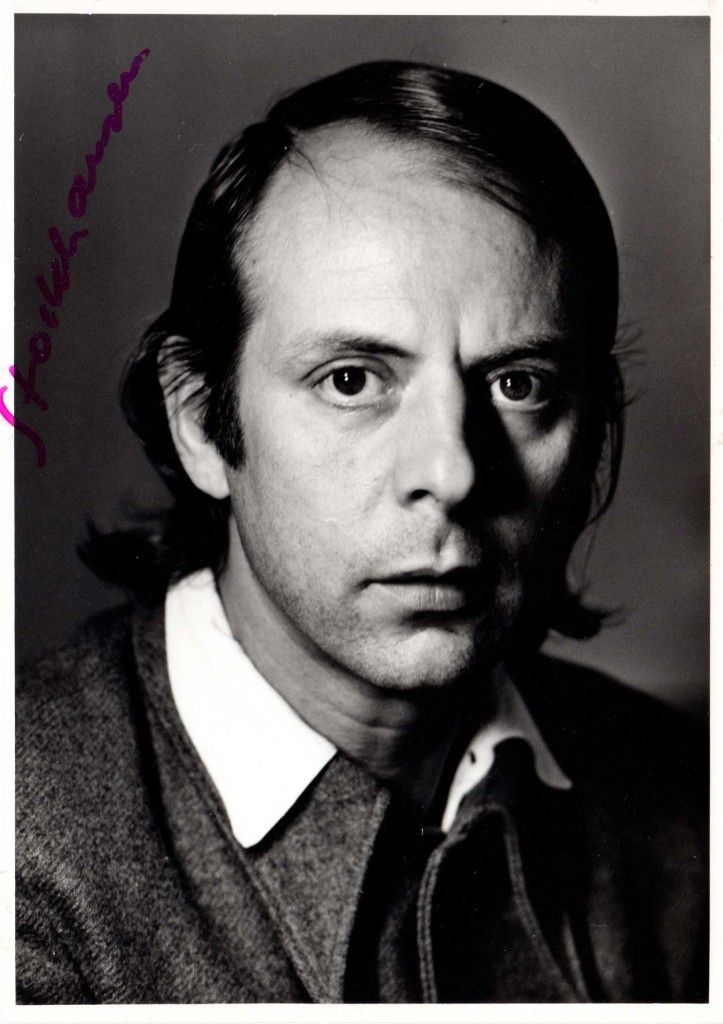 near Cologne. We often mention his name, and always somewhat anxiously: Stockhausen’s music is often very difficult. He was one of the most important composers of the second half of the 20th century, expanding serial composition technique with aleatory, or chance, elements. In the 1950s he was (along with Pierre Boulez and Luigi Nono) one of the most influential figures in the Darmstadt Summer Courses. What is interesting (and, by today’s standards, quite incredible) is that in the 1960s he was the second most recorded composer of the 20th century, after Stravinsky. In the 1970s Stockhausen was appointed professor of composition at the Cologne Musikhochschule. Also in the 1970s Stockhausen started working on his magnum opus. a cycle of seven operas Licht (Light), subtitled "Die sieben Tage der Woche" (The Seven Days of the Week). It was completed in 2003 and consists of 29 hours of music.
near Cologne. We often mention his name, and always somewhat anxiously: Stockhausen’s music is often very difficult. He was one of the most important composers of the second half of the 20th century, expanding serial composition technique with aleatory, or chance, elements. In the 1950s he was (along with Pierre Boulez and Luigi Nono) one of the most influential figures in the Darmstadt Summer Courses. What is interesting (and, by today’s standards, quite incredible) is that in the 1960s he was the second most recorded composer of the 20th century, after Stravinsky. In the 1970s Stockhausen was appointed professor of composition at the Cologne Musikhochschule. Also in the 1970s Stockhausen started working on his magnum opus. a cycle of seven operas Licht (Light), subtitled "Die sieben Tage der Woche" (The Seven Days of the Week). It was completed in 2003 and consists of 29 hours of music.
Of the three Stockhausen’s pieces in our library, two received “one note,” the lowest rating. Still, we’d like to offer our more adventuresome listeners an early piece called Kreuzspiel (here). It’s not very complicated and, we think, is a lot of fun. Kreuzspiel is performed by the Netherland-based Ives Ensemble. Permalink
This Week in Classical Music: August 9, 2021. Many composers and one Solomon. We’d like to acknowledge several composers, none of them great, all very interesting: a Venezuelan-born Frenchman Reynaldo Hahn (born August 9th of 1874): it’s not clear if these days he’s better known for his wonderful songs or the friendship with Marcel Proust. Alexander Glazunov, a Russian composer, was also born on August 9th, in 1865. He was a prolific composer of rather old-fashioned music. Glazunov led the St-Petersburg Conservatory during a very difficult time after the revolution; Dmitry Shostakovich was his pupil. Heinrich Ignaz Biber, an Austrian composer, was born in Bohemia on August 12th of 1644, he’s known for his violin music. Maurice Greene (born August 12th of 1696) was an English composer who wrote several popular “anthems.” Another English composer, Kaikhosru Shapurji Sorabji, one of the most unusual composers of all time, was born on August 14th of 1892 (we wrote a brief on him here). His father was a Parsi. Samuel Coleridge-Taylor, yet another English composer, was born on August 15th of 1875. Coleridge-Taylor was highly regarded during his lifetime but then his fame faded rapidly. Coleridge-Taylor’s father was from the African country of Sierra-Leone, which may explain why his music was played more often throughout the last year than during the previous 30. This is not all: the delightful French composer, Jacques Ibert, was born on August 15th of.jpg) 1890. August 15th is also the birthday of the American Lucas Foss (b. 1922).
1890. August 15th is also the birthday of the American Lucas Foss (b. 1922).
Now, to the performers. The British pianist known professionally as Solomon was born Solomon Cutner on August 9th of 1902. He had a most unusual career: a child prodigy, he made his public debut at the age of eight, playing Tchaikovsky’s First Piano Concerto at the Queen’s Hall. Just a couple years later he stopped performing and disappeared for about 10 years. In 1924 he returned to the stage, his technique intact. He toured across Europe and in the US, played for the troops during WWII and later formed a famed trio with the violinist Zino Francescatti and cellist Pierre Fournier. Solomon brilliantly played a broad repertoire, including Brahms, Liszt and Tchaikovsky. He was a great interpreter of such disparate composers as Beethoven and Chopin. Here is Chopin’s Berceuse, recorded in 1946. Solomon loved to play Brahms’s Intermezzo in C Major Op. 119 No. 3, both during the main program or as an encore. Here’s a recording from 1952.
The wonderful Italian pianist Aldo Ciccolini was born on August 15th of 1925. Also this week: the brilliant violinist Ginette Neveu, born on the 11th of August of 1919, who tragically died in a place crash at the age of 30.Permalink
This Week in Classical Music: August 2, 2021. Short takes. We’ll follow the lead of the musicologist Alejandro Planchart who, after sorting out all kind of information, had determined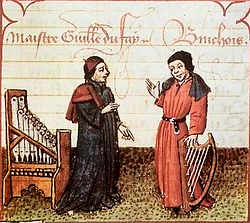 that Guillaume Dufay was born on August 5th of 1397. Dufay (his name was also spelled as Du Fay and Du Fayt) was the most famous composer of his time, that being the early Renaissance of European music. (The picture to the left indirectly attests to his fame: depicted on the left is Guillaume Dufay, on the right – Gilles Binchois, three years younger but also a famous composer; the script above the figures calls Dufay, and only him, “maître,” or master– Binchois is identified just by his name). We’ve written about Dufay a number of times, the last time just a year ago when we analyzed his peregrinations around Europe, here, which are absolutely fascinating, considering the distances he traveled and the general lack of any transportation infrastructure. Getting back to music: what we also find interesting is the use of certain technical devices, which changed as music forms were being developed. For example, early in his career, Dufay wrote what is called “isorhythmic” music. Isorhythm is just a way of using a fixed rhythmic pattern, called talea, which repeats, without change, in one of the voices, usually in the tenor. The use of talea was invented in the Middle Ages, was used by composers like Guillaume de Machaut, and was supposed to give certain structure to the musical piece. That’s how Dufay wrote his motets and masses early on. He dropped this device to write freer and more melodic music later in his career. Here’s Dufay’s early isorhythmic motet, Vasilissa ergo gaude (Therefore rejoice, princess) from about 1420. It’s performed by the Huelgas Ensemble, Paul Van Nevel conducting. And here’s the section Gloria in excelsis Deo from Dufay’s mass Missa ave regina, which was written later in his life, after 1463 (Dufay died in 1474). Ensemble Cantus Figuratus is led by Dominique Vellard.
that Guillaume Dufay was born on August 5th of 1397. Dufay (his name was also spelled as Du Fay and Du Fayt) was the most famous composer of his time, that being the early Renaissance of European music. (The picture to the left indirectly attests to his fame: depicted on the left is Guillaume Dufay, on the right – Gilles Binchois, three years younger but also a famous composer; the script above the figures calls Dufay, and only him, “maître,” or master– Binchois is identified just by his name). We’ve written about Dufay a number of times, the last time just a year ago when we analyzed his peregrinations around Europe, here, which are absolutely fascinating, considering the distances he traveled and the general lack of any transportation infrastructure. Getting back to music: what we also find interesting is the use of certain technical devices, which changed as music forms were being developed. For example, early in his career, Dufay wrote what is called “isorhythmic” music. Isorhythm is just a way of using a fixed rhythmic pattern, called talea, which repeats, without change, in one of the voices, usually in the tenor. The use of talea was invented in the Middle Ages, was used by composers like Guillaume de Machaut, and was supposed to give certain structure to the musical piece. That’s how Dufay wrote his motets and masses early on. He dropped this device to write freer and more melodic music later in his career. Here’s Dufay’s early isorhythmic motet, Vasilissa ergo gaude (Therefore rejoice, princess) from about 1420. It’s performed by the Huelgas Ensemble, Paul Van Nevel conducting. And here’s the section Gloria in excelsis Deo from Dufay’s mass Missa ave regina, which was written later in his life, after 1463 (Dufay died in 1474). Ensemble Cantus Figuratus is led by Dominique Vellard.
Several composers from the modern era were also born this week: the Frenchman André Jolivet on August 8th of 1905 in Montmartre, Paris, and the American, William Schuman, on August 4th of 1910, in Manhattan, New York. Another French composer, Cécile Chaminade, was born on August 8th of 1857, also in Paris. With recent changes in cultural attitudes, Chaminade has enjoyed more popularity than any time since her death in 1944. We’ll have a guest post about Chaminade coming soon. Also, Erich Kleiber, the great Austrian conductor, was born on August 5th of 1890, in Vienna. He moved to Berlin in 1923 to assume the directorship of the Berlin State Opera. Kleiber, who was neither Jewish nor politically active and therefore could have continued to live and conduct safely in Germany, left the country in protest to the Nazi regime’s policies and emigrated to Argentina. Erich Kleiber was the father of Carlos Kleiber, also a celebrated conductor.Permalink